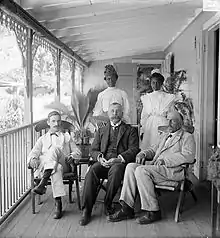cúigear
Irish

cúigear
Etymology
From Old Irish cóicer, possibly from cóic (“five”) + fer (“man”), though that may be a folk etymology.
Pronunciation
- IPA(key): /ˈkuːɟəɾˠ/
Noun
cúigear m (genitive singular cúigir, nominative plural cúigir) (triggers no mutation)
- a group of five people
- Tá cúigear mac agam. ― I have five sons.
Usage notes
- Generally used with the genitive plural when referring to human beings and the preposition de when referring to other things.
Declension
Declension of cúigear
First declension
|
Bare forms:
|
Forms with the definite article:
|
Mutation
| Irish mutation | ||
|---|---|---|
| Radical | Lenition | Eclipsis |
| cúigear | chúigear | gcúigear |
| Note: Some of these forms may be hypothetical. Not every possible mutated form of every word actually occurs. | ||
Further reading
- Ó Dónaill, Niall (1977) “cúigear”, in Foclóir Gaeilge–Béarla, Dublin: An Gúm, →ISBN
- G. Toner, M. Ní Mhaonaigh, S. Arbuthnot, D. Wodtko, M.-L. Theuerkauf, editors (2019), “cóicer”, in eDIL: Electronic Dictionary of the Irish Language
This article is issued from Wiktionary. The text is licensed under Creative Commons - Attribution - Sharealike. Additional terms may apply for the media files.